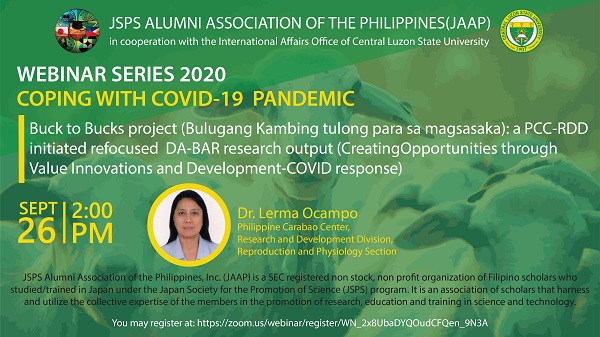2020年9月26日(土)、JSPSフィリピン同窓会(JAAP)がWeb Lectureを開催しました。
このWeb Lectureは、WEBINAR SERIES 2020 “COPING WITH COVID-19 PANDEMIC”の第2回目で、今回もセントラル・ルザン州立大学(Central Luzon State University)国際室の協力を得て行いました。
JAAPのDr. Renato G. Reyes会長(Vice President for Academic Affairs, Central Luzon State University)、JSPSバンコク研究連絡センターの大谷センター長の挨拶の後、Dr. Lerma Cajuigan-Ocampo(Senior Science Research Specialist Department Of Agriculture-Philippine Carabao Center)が“Buck to Bucks project (Bulugang Kambing tulong para sa magsasaka): a PCC-RDD initiated refocused DA-BAR research output (Creating Opportunities through Value Innovations and Development-COVID response”の講演を行いました。
このWeb Lectureへの参加者は約150名でした。講演終了後は多くの質問が寄せられ、講演者は丁寧に質問に答えていました。
最後に、JAAP副会長のDr. Danilda H. Duran氏から挨拶があり、盛会のうちにWeb Lectureは終了しました。

Lerma Cajuigan-Ocampo, DVSM, MAgr., PhD
Senior Science Research Specialist
Department Of Agriculture-Philippine Carabao Center
Abstract of the Lecture
The FAO-Global Action to establish Animal Genetic Resources Cryobanks for sustainable agriculture from food animals has intensified efforts to conserve germplasm not only from genetically superior breeds but has likewise opened doors for genetically diverse native farm animals with climate resiliency and prolificacy traits. However, semen collection from native animals can be difficult to achieve. A Department of Agriculture -Bureau of Agricultural Research (DA-BAR phase I and II) jointly funded research project with DA-Philippine Carabao Center resulted in the establishment of a method to recover viable/live sperm from post mortem testicular epididymis using the native goat as the animal research model with the potential technique applicable to native small ruminants and likewise for wildlife ruminant cryo-conservation. The recovered ‘epididymal sperm’ were found physiologically fertile in vitro and were therefore preserved frozen at cryogenic temperature of negative 196°C. The frozen epididymal sperm were later used for Artificial Insemination of Boer female goats at PCC terminating in full term pregnancies with 1 male and 3 female ‘Epid kids’ born in February 16, 2019. The first born ‘Kuyang Epid buck’ is now a proven sire and has four male bucks born between December 2019 and February 2020. In support to the Department of Agriculture’s immediate intervention ALPAS covid-19 (Ahon Lahat PAgkaing Sapat) kontra covid, the Buck to Bucks project (Bulugang kambing tulong sa Magsasaka) was launched in July as a component of the DA-PCC’s Creating Opportunities through Value Innovations and Development project (COVID) response. In close coordination with the Local Government Unit of a municipality in close proximity to DA-PCC an Epid buck will be entrusted to a farmer to breed his estrus synchronized native goats in order to produce kids with improved bloodline or a better version of the dam. Once the goats are confirmed pregnant by ultrasonography a month later, the Epid buck will be transferred to the next goat farmer identified by the LGU for the same purpose and to the next farmer and so on. Overall, the project aims to roll out goat reproductive biotechnology research outputs to local communities for enhanced goat production efficiencies thus augmenting the farmer’s income and supplying the food chain amidst the current pandemic situation.









